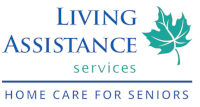If you have aging loved ones, you may have heard the term “ADLs” used by healthcare professionals, particularly if a medical or cognitive assessment was involved. This acronym refers to Activities of Daily Living — relatively simple things we all do every day such as bathing, brushing our teeth or getting dressed.
As people grow older, they may begin to require increasing levels of support with common tasks. Here’s a closer look at what ADLs are and how a Personal Support Worker (PSW) can help seniors live safely and independently at home for longer.
What is an Activity of Daily Living?
Activities of Daily Living include basic personal care and other functions that are required for everyday life. This includes the following:
- Personal hygiene: bathing, washing hair, oral care, nail care, etc.
- Dressing: choosing weather-appropriate clothing and shoes, selecting clothing that is appropriate for various settings, physically putting on those clothes.
- Toileting: also referred to as continence management, this refers to the physical and cognitive ability to properly use the washroom.
- Feeding: eating and drinking, either with or without assistance.
- Mobility and ambulation: being able to change position in bed or while seated, and possessing the ability to stand and walk independently.
Many seniors can do some of these things independently but struggle with one or two specific issues. They may also have anxiety about an activity such as bathing due to the risk of falling in the tub or shower. If anxiety prevents someone from bathing or causes them to bathe less frequently, it would mean they’re struggling with this ADL.
Understanding IADLs and a senior’s ability to thrive
ADLs cover the basic functions required to live independently, but they don’t cover additional abilities required to thrive. Instrumental Activities of Daily Living (IADLs) are a secondary group of critical skills including the ability to drive or take public transportation without assistance, shop for groceries and prepare meals, manage finances and the responsibilities of a household, and manage medications. IADLs also include communication skills and functions related to mental health.
When ADLs or IADLs become an issue for seniors, family members often step in to help. However, as more care is required, the level of care needed may exceed what a family can offer. This is particularly true if family caregivers are working full-time or have young children at home. Often referred to as the Sandwich Generation, they have a double burden of care and simply cannot do it all.
How Living Assistance Services can help support seniors at home
Getting support for a loved one shouldn’t be a source of hesitation or shame—instead, be glad you’re able to offer them compassionate, comprehensive care. Living Assistance Services works with skilled, dedicated Personal Care Workers (PSWs) to provide in-home care for seniors and other individuals requiring assistance. This includes supporting ADLs as well as IADLs and offering joyful companionship to support emotional well-being and mental health.
We don’t just work with seniors who require long-term support. Living Assistance Services can provide personal care on a temporary basis if respite or convalescent care is required. Our caregivers are also available to provide supplementary care in retirement homes and long-term care facilities as well as hospitals.
Your loved ones deserve autonomy, independent living conditions and exceptional support. To view a full list of homecare services and Living Assistance Services locations across the greater Toronto area, please explore our website. If you think our PSWs may be a good fit for your family, please contact us—we’d be pleased to offer a no obligation personalized consultation.

